GALLUP NEWS SERVICE
PRINCETON, NJ -- Americans make a clear distinction between their support for the war in Iraq and their support for the U.S. troops serving there. Only 36% of Americans say they have a favorable view of the Iraq war, but 72% have a favorable view of the U.S. military personnel involved in it. Still, 17% of Americans hold a negative opinion of the U.S. military personnel in Iraq.
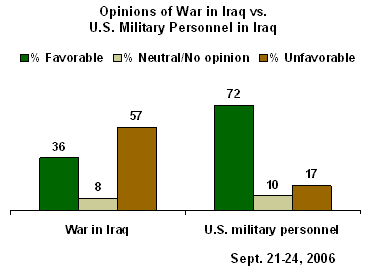
These results are from the latest Gallup Panel survey, conducted Sept. 21-24, 2006. The nationally representative telephone survey finds Republicans and Democrats at extreme odds over the Iraq war, but majorities in both groups support the troops, only to different degrees.
Democrats More Intense Than Republicans About the War
Two-thirds of Republicans (68%) say they have a favorable view of the Iraq war, while nearly 9 in 10 Democrats (88%) have an unfavorable view. But even this contrast understates the difference between the parties on the war. Not only do most Democrats have an unfavorable view of the Iraq war, but three-quarters (74%) have a very unfavorable view of it. Republicans are much less likely to feel strongly in support of the war (only 29% are very favorable). The plurality of Republicans (39%) say they have a somewhat favorable opinion of it. (Independents, not shown in the accompanying graph, fall about half-way between the two major party groups in their views.)
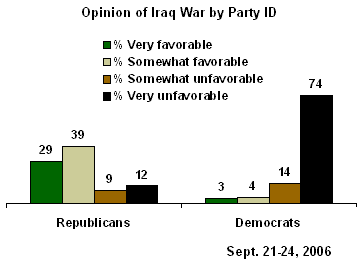
Consensus Support for the Troops
There is far less distance between partisans' reactions to the men and women serving in Iraq. Overall, 90% of Republicans have either a very favorable or a somewhat favorable opinion of the U.S. military personnel in Iraq, as do 60% of Democrats. Negative views of U.S. military personnel are minimal among Republicans (held by only 5%), but expand to 28% among Democrats. This figure is 19% among political independents.
Looking at the more detailed results, a solid majority of Republicans (64%) have a very favorable view of military personnel, contrasted with 42% of Democrats.
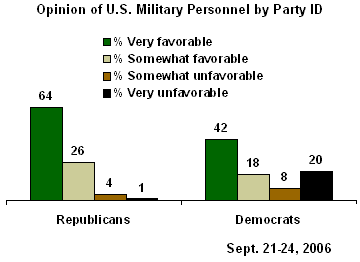
Graying Democratic Women Are Troops Biggest Detractors
In addition to Democrats, another group that shows relatively high negativity toward U.S. military personnel involved in Iraq is women aged 50 and older. Twenty-eight percent of this group holds an unfavorable view of the troops, compared with at most 15% of younger women or men in either age group.
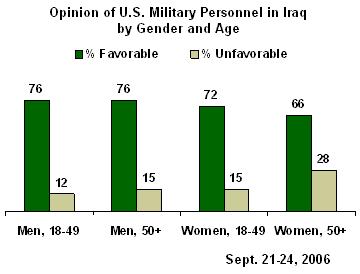
A closer review of the data reveals that this pattern is exclusively attributable to women within the Democratic Party. Republican women and women who lean Republican who are aged 50 and older hold the same views about the troops as do younger Republican women. However, among Democratic women and women who lean Democratic there is a sharp difference in views by age. Forty-two percent of Democratic women aged 50 and older hold an unfavorable view of them, compared with only 21% of Democratic women aged 18 to 49.
|
Opinion of U.S. Military Personnel in Iraq |
||||
|
Men 18-49 |
Men 50+ |
Women 18-49 |
Women 50+ |
|
|
% |
% |
% |
% |
|
|
Republicans/Lean Rep |
|
|
|
|
|
Favorable |
93 |
92 |
85 |
85 |
|
Unfavorable |
3 |
2 |
8 |
11 |
|
|
|
|
|
|
|
Democrats/Lean Dem |
|
|
|
|
|
Favorable |
65 |
64 |
63 |
50 |
|
Unfavorable |
19 |
25 |
21 |
42 |
War's Critics Also Support the Troops
Nearly all Americans with a favorable opinion about the war in Iraq also have a favorable view of the U.S. military personnel serving in that war (93%). However, a majority of Americans who oppose the war also have a favorable view of the troops (60%); 28% have an unfavorable view.
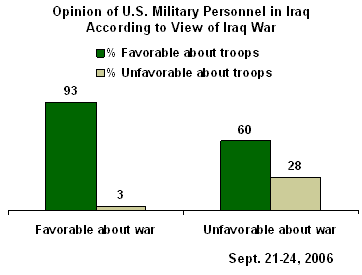
Survey Methods
These results are based on telephone interviews with 1,010 national adults, aged 18 and older, conducted Sept. 21-24, 2006, using the Gallup Panel. Respondents were randomly drawn from Gallup's nationally representative household panel, which was originally recruited through random selection methods. For results based on the total sample of national adults, one can say with 95% confidence that the maximum margin of sampling error is ±3 percentage points. In addition to sampling error, question wording and practical difficulties in conducting surveys can introduce error or bias into the findings of public opinion polls.
20. Generally speaking, how do you feel toward the war in Iraq - [ROTATED: very favorable, somewhat favorable, neutral, somewhat unfavorable, (or) very unfavorable]?
|
|
Very |
Somewhat |
|
Somewhat |
Very |
No |
|
|
|
|
|
|
|
|
|
2006 Sep 21-24 |
15% |
21 |
8 |
13 |
44 |
* |
21. Generally speaking, how do you feel toward U.S. military personnel involved in the Iraq War - [ROTATED: very favorable, somewhat favorable, neutral, somewhat unfavorable, (or) very unfavorable]?
|
|
Very favorable |
Somewhat favorable |
|
Somewhat unfavorable |
Very unfavorable |
No |
|
|
|
|
|
|
|
|
|
2006 Sep 21-24 |
51% |
21 |
9 |
6 |
11 |
1 |